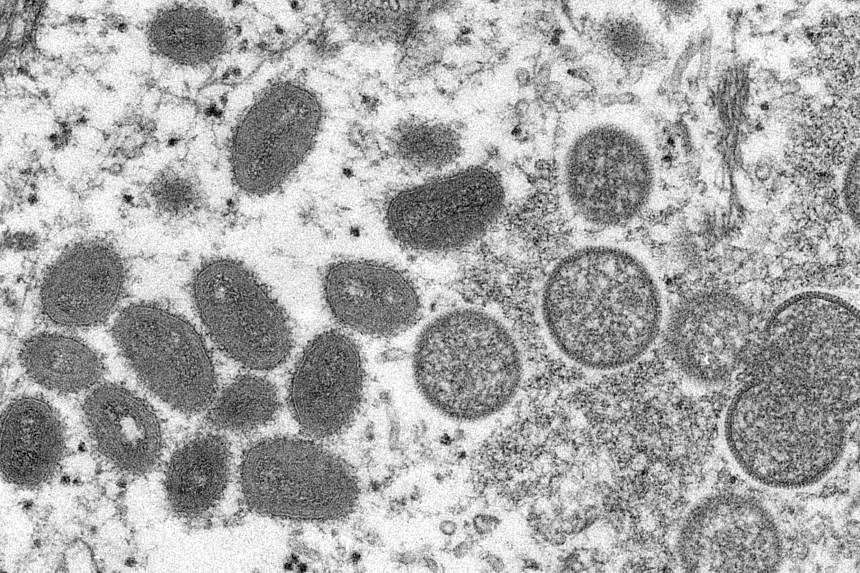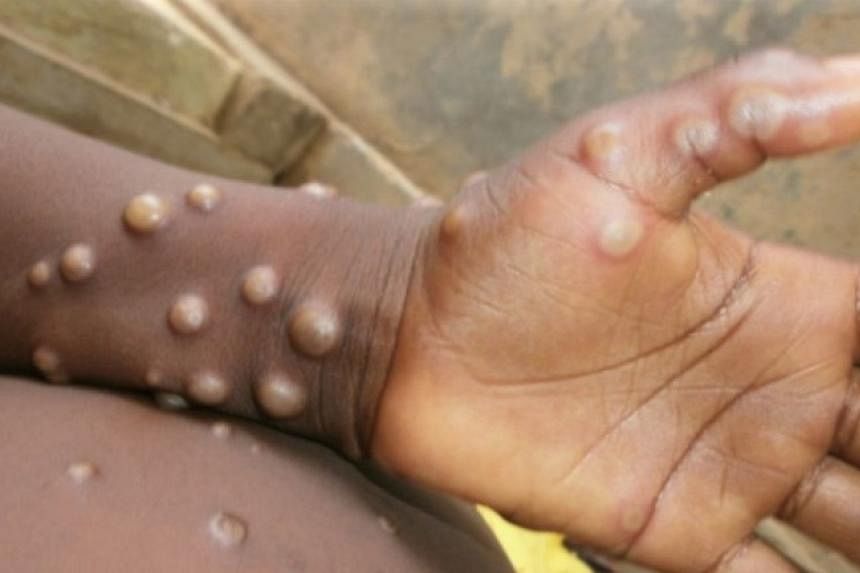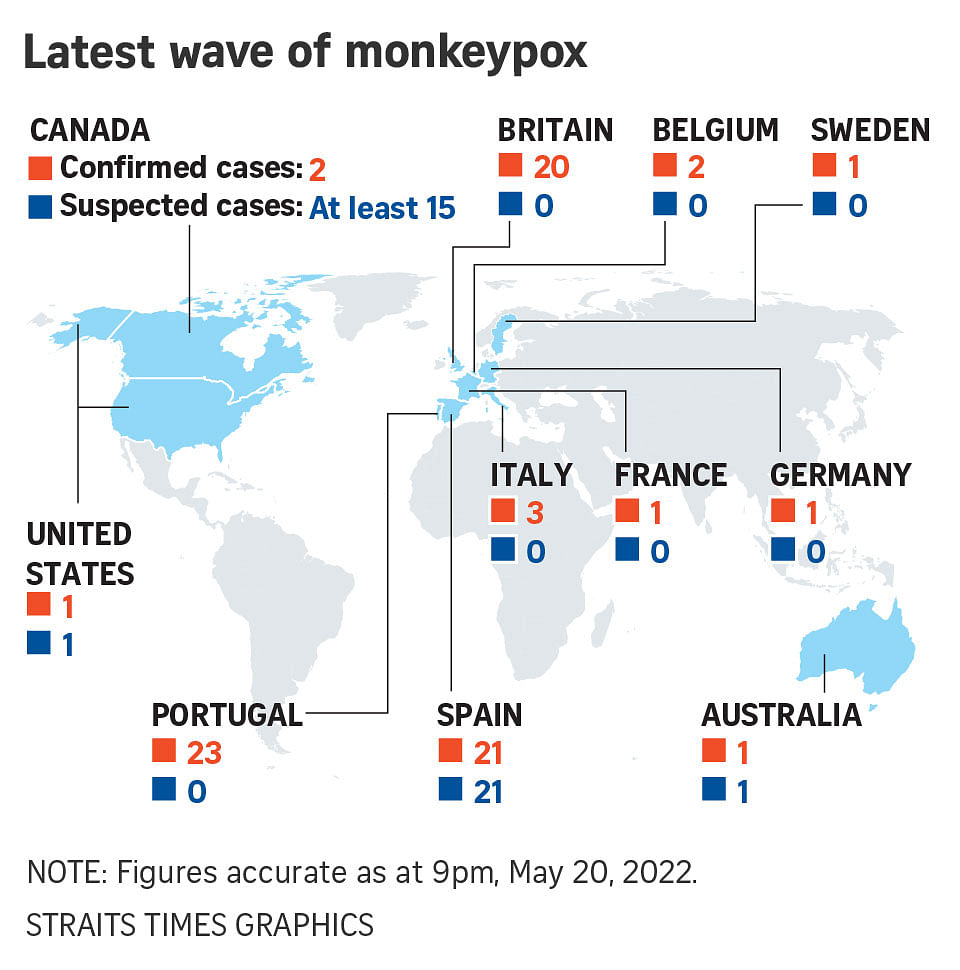
Fewer than 200 confirmed and suspected cases of monkeypox have been recorded so far. PHOTO: AFP
UPDATED
MAY 24, 2022
GENEVA (AFP) - The monkeypox outbreaks in non-endemic countries can be contained and human-to-human transmission of the virus stopped, the World Health Organisation (WHO) said on Monday (May 23).
Fewer than 200 confirmed and suspected cases had been recorded so far, the WHO's emerging disease lead Maria Van Kerkhove said.
"This is a containable situation, particularly in the countries where we are seeing these outbreaks that are happening across Europe, in North America as well," Ms Van Kerkhove told a live interaction on the UN health agency's social media channels.
"We want to stop human-to-human transmission. We can do this in the non-endemic countries.
"We're in a situation where we can use public health tools of early identification, supported isolation of cases.
"We can stop human-to-human transmission."
Ms Van Kerkhove said transmission was happening via "close physical contact: skin-to-skin contact", and that most of the people identified so far had not had a severe case of the disease.
Ms Rosamund Lewis, who heads the smallpox secretariat on the WHO emergencies programme, said monkeypox had been known for at least 40 years and a few cases had appeared in Europe over the last five years in travellers from the endemic regions.
However, "this is the first time we're seeing cases across many countries at the same time and people who have not travelled to the endemic regions in Africa", she said.
She cited Nigeria, Cameroon, the Central African Republic and the Democratic Republic of the Congo.
"It is primarily in the animal kingdom in forested areas. Now we're seeing it more in urban areas," she said.
Mutation studies
Ms Lewis said it was not yet known whether the virus had mutated, but viruses in the wider orthopoxvirus group "tend not to mutate and they tend to be fairly stable".
"We don't have evidence yet that there is mutation in the virus itself," she said. Virologists will be studying the first genomic sequences of the virus coming through, she added.
Ms Van Kerkhove said a major global meeting next week would discuss research, epidemiology, diagnostics, therapeutics and vaccines.
Mr Andy Seale, strategies adviser at the WHO's global HIV, hepatitis and sexually transmitted infections programmes, stressed that while the virus could be caught through sexual activity, it was not a sexually transmitted disease.
"While we are seeing some cases amongst men who have sex with men, this is not a gay disease, as some people in social media have attempted to label it. That's just not the case," he added.
"This demographic is generally a demographic that really does take care of health screening... They've been proactive about responding to unusual symptoms.
"Anybody can contract monkeypox through close contact."
Ms Van Kerkhove added that as surveillance widened, experts did expect to see more cases.
Why monkeypox cases are rising in Europe

Why now?
One likely scenario behind the increase in cases is increased travel as Covid-19 restrictions are lifted.
"My working theory would be that there's a lot of it about in west and central Africa, travel has resumed, and that's why we are seeing more cases," said Whitworth.

Monkeypox puts virologists on the alert because it is in the smallpox family, although it causes less serious illness.
Smallpox was eradicated by vaccination in 1980, and the shot has been phased out. But it also protects against monkeypox, and so the winding down of vaccination campaigns has led to a jump in monkeypox cases, according to Anne Rimoin, an epidemiology professor at UCLA in California.
But experts urged people not to panic.
"This isn't going to cause a nationwide epidemic like Covid did, but it's a serious outbreak of a serious disease - and we should take it seriously," said Whitworth.


Symptoms in humans of monkeypox – which is endemic in parts of Central and Western Africa – include lesions, fever, muscle ache and chills.
PHOTO: INTERNET
PUBLISHED
MAY 19, 2022
LONDON (REUTERS) - A handful of cases of monkeypox have now been reported or are suspected in the United Kingdom, Portugal and Spain.
The outbreaks are raising alarm because the disease mostly occurs in west and central Africa, and only very occasionally spreads elsewhere.
Here's what scientists know so far.
'Highly unusual'
Monkeypox is a virus that causes fever symptoms as well as a distinctive bumpy rash. It is usually mild, although there are two main strains: the Congo strain, which is more severe - with up to 10 per cent mortality - and the West African strain, which has a fatality rate of more like 1 per cent of cases. The UK cases have been reported as the West African strain.
"Historically, there have been very few cases exported. It has only happened eight times in the past before this year," said Jimmy Whitworth, a professor of international public health at the London School of Hygiene and Tropical Medicine, who said it was "highly unusual".
Portugal has logged five confirmed cases, and Spain is testing 23 potential cases.
Neither country has reported cases before.
Transmission
The virus spreads through close contact, both in spillovers from animal hosts and, less commonly, between humans. It was first found in monkeys in 1958, hence the name, although rodents are now seen as the main source of transmission.
Transmission this time is puzzling experts, because a number of the cases in the United Kingdom - nine as of May 18 - have no known connection with each other. Only the first case reported on May 6 had recently travelled to Nigeria.
As such, experts have warned of wider transmission if cases have gone unreported.
The UK Health Security Agency's alert also highlighted that the recent cases were predominantly among men who self-identified as gay, bisexual or men who have sex with men, and advised those groups to be alert.
Scientists will now sequence the virus to see if they are linked, the World Health Organisation (WHO) said this week.
PUBLISHED
MAY 19, 2022
LONDON (REUTERS) - A handful of cases of monkeypox have now been reported or are suspected in the United Kingdom, Portugal and Spain.
The outbreaks are raising alarm because the disease mostly occurs in west and central Africa, and only very occasionally spreads elsewhere.
Here's what scientists know so far.
'Highly unusual'
Monkeypox is a virus that causes fever symptoms as well as a distinctive bumpy rash. It is usually mild, although there are two main strains: the Congo strain, which is more severe - with up to 10 per cent mortality - and the West African strain, which has a fatality rate of more like 1 per cent of cases. The UK cases have been reported as the West African strain.
"Historically, there have been very few cases exported. It has only happened eight times in the past before this year," said Jimmy Whitworth, a professor of international public health at the London School of Hygiene and Tropical Medicine, who said it was "highly unusual".
Portugal has logged five confirmed cases, and Spain is testing 23 potential cases.
Neither country has reported cases before.
Transmission
The virus spreads through close contact, both in spillovers from animal hosts and, less commonly, between humans. It was first found in monkeys in 1958, hence the name, although rodents are now seen as the main source of transmission.
Transmission this time is puzzling experts, because a number of the cases in the United Kingdom - nine as of May 18 - have no known connection with each other. Only the first case reported on May 6 had recently travelled to Nigeria.
As such, experts have warned of wider transmission if cases have gone unreported.
The UK Health Security Agency's alert also highlighted that the recent cases were predominantly among men who self-identified as gay, bisexual or men who have sex with men, and advised those groups to be alert.
Scientists will now sequence the virus to see if they are linked, the World Health Organisation (WHO) said this week.
Why now?
One likely scenario behind the increase in cases is increased travel as Covid-19 restrictions are lifted.
"My working theory would be that there's a lot of it about in west and central Africa, travel has resumed, and that's why we are seeing more cases," said Whitworth.

Portugal has logged five confirmed cases of monkeypox (above), and Spain is testing 23 potential cases.
Monkeypox puts virologists on the alert because it is in the smallpox family, although it causes less serious illness.
Smallpox was eradicated by vaccination in 1980, and the shot has been phased out. But it also protects against monkeypox, and so the winding down of vaccination campaigns has led to a jump in monkeypox cases, according to Anne Rimoin, an epidemiology professor at UCLA in California.
But experts urged people not to panic.
"This isn't going to cause a nationwide epidemic like Covid did, but it's a serious outbreak of a serious disease - and we should take it seriously," said Whitworth.

No comments:
Post a Comment